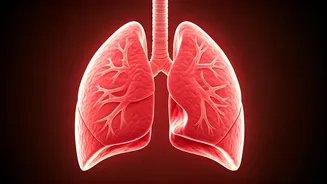Processed Meats' Impact
Processed meats, often a staple in many diets, can significantly impact lung health. These meats, including bacon, sausages, and deli meats, typically
contain nitrates and nitrites. When consumed, these additives can create harmful compounds in the body that may contribute to lung inflammation. This inflammation, in turn, can exacerbate existing respiratory conditions and make breathing more difficult. Furthermore, the high salt content in these processed foods can also lead to fluid retention, potentially placing added stress on the lungs. Reducing your intake of processed meats and opting for fresh, unprocessed alternatives is a step toward protecting your respiratory health and promoting easier breathing. Be mindful of labels, and consider the potential long-term effects of consuming these foods regularly.
Sugary Drinks' Drawbacks
Sugary drinks are often overlooked when considering lung health, yet they pose significant risks. Sodas, sweetened juices, and energy drinks are loaded with refined sugars that can trigger inflammation throughout the body, including the lungs. Chronic inflammation is a significant factor in respiratory issues, potentially worsening conditions like asthma and COPD. High sugar intake can also lead to weight gain and obesity, which places additional strain on the lungs, making it harder to breathe. Beyond these direct effects, sugary drinks often displace healthier beverage choices, reducing the intake of essential nutrients and antioxidants that support lung function. Limiting or eliminating sugary drinks can lead to decreased inflammation, a healthier weight, and improved overall respiratory health.
Dairy's Respiratory Role
Dairy products, though a dietary staple for many, can present challenges for respiratory health. Some individuals find that dairy, especially in large quantities, may thicken mucus production in the airways. This increased mucus can make it harder to breathe and can trigger or worsen symptoms of respiratory conditions such as asthma, bronchitis, and allergies. While not everyone experiences these effects, those prone to respiratory issues may find that reducing or eliminating dairy can significantly improve their breathing. Consider trying dairy alternatives, like almond or soy milk, to see if it alleviates respiratory symptoms. Pay attention to how your body responds to dairy and adjust your diet accordingly to optimize your respiratory well-being and breathe more easily.
Salty Foods' Hazards
Excessive salt intake can be detrimental to lung health by potentially causing fluid retention within the body, which can put extra pressure on the lungs and make breathing more difficult. High sodium levels can exacerbate existing respiratory conditions, such as asthma and chronic obstructive pulmonary disease (COPD). Foods like processed snacks, fast food, and canned goods often contain high levels of sodium. Consuming these foods frequently can lead to increased fluid retention, hindering optimal lung function. It's advisable to carefully monitor sodium intake, read food labels, and consider using herbs and spices in place of salt to flavor foods. Prioritizing low-sodium options can support respiratory health and contribute to easier breathing by reducing the workload on the lungs and promoting overall well-being.
Fried Foods' Impact
Fried foods, beloved by many, may negatively influence lung health due to their high fat content and potential to create inflammatory compounds. When foods are fried, they often absorb large amounts of unhealthy fats, which can trigger inflammation throughout the body. Chronic inflammation is a significant contributor to various respiratory problems. Also, the high temperature during frying can generate harmful substances like acrolein, which can irritate the lungs and airways. Regularly consuming fried foods may worsen symptoms in individuals with respiratory issues and make breathing more challenging. Choosing healthier cooking methods, such as baking, grilling, or steaming, can help you reduce the intake of harmful fats and protect your lungs from inflammation. Be mindful of how frequently you consume fried foods to maintain good respiratory health.
Alcohol's Respiratory Effects
Excessive alcohol consumption can negatively impact lung health through multiple pathways. Alcohol can weaken the immune system, making the lungs more susceptible to infections like pneumonia and bronchitis. The consumption can also cause inflammation in the lungs, making it harder to breathe. Furthermore, alcohol can suppress the cough reflex, which can enable harmful substances to build up in the airways. While moderate alcohol consumption may not significantly affect lung health for all individuals, excessive drinking can exacerbate respiratory conditions. Limiting or avoiding alcohol altogether can help maintain optimal respiratory function and reduce the risk of lung infections. Consider how much alcohol you consume and its potential impact on your respiratory health, making informed choices for improved well-being.
Refined Grains' Influence
Refined grains, such as white bread, pasta, and pastries, may indirectly impact lung health. These foods tend to have a high glycemic index, meaning they can cause rapid spikes in blood sugar. These fluctuations can trigger inflammatory responses throughout the body. Chronic inflammation is a potential risk factor for the development and worsening of respiratory conditions. Refined grains often lack the fiber and nutrients found in whole grains, contributing to poor overall health. Eating a diet rich in whole grains, fruits, and vegetables can provide essential nutrients and antioxidants, which support lung health and reduce inflammation. Switching from refined grains to whole grain alternatives can benefit your respiratory well-being and contribute to easier breathing by promoting a balanced diet and reducing potential inflammatory responses.












